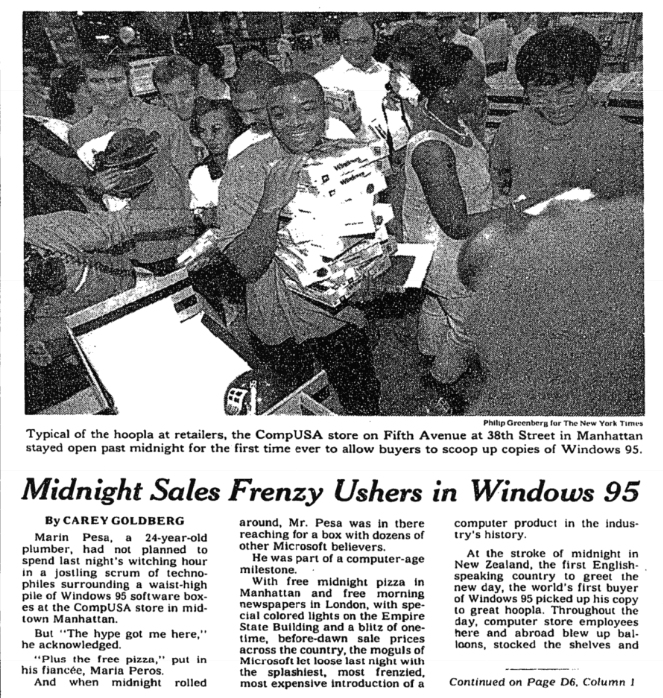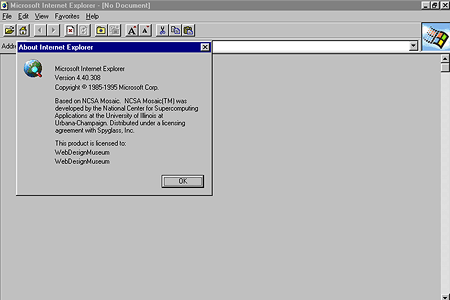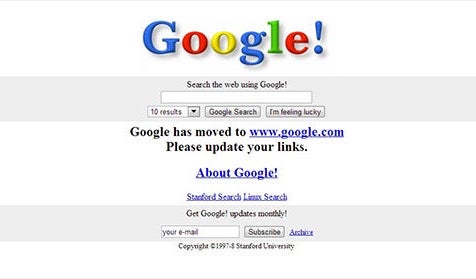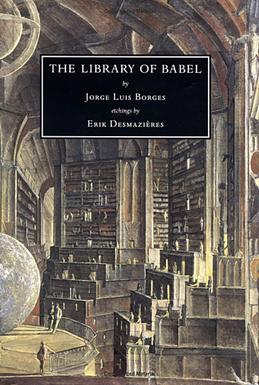Week 5: 1992–2000
Navigation: Browsers, Portals, Search




On August 24, 1995, Microsoft launched its new operating system in a grand cultural event, headlined by late-night talk show host Jay Leno and featuring unforgettable dance performances by Bill Gates and Steve Ballmer (see a full breakdown of the dance here). Computer stores opened to long lines at midnight, as people camped outside with the excitement of a record release. The New York Times reported of “free midnight pizza in Manhattan and free newspapers in London,” with one early-adopter admitting candidly, “The hype got me here.” With its new Start menu, promoted through the addictive Rolling Stones hook “Start Me Up,” Windows 95 promised a generational shift in interface design and became the gateway for millions to get in on the personal computing trend. Tucked inside a bonus pack of the release was the Internet Jumpstart Kit, which included the first built-in Windows web browser, Internet Explorer 1.0. Although the browser was far behind the market leader at the time, Netscape Navigator, it had the advantage of being right there, already installed on people’s computers, and as the years wore on after the release of Windows 95, Internet Explorer caught up with Netscape and achieved near singular dominance of the web browser market by 2003.
But winning the browser war against Netscape never secured internet dominance for Microsoft. As with other established companies venturing into the online space, such as media giants Time-Warner with Pathfinder.com and Disney with Go.com, Microsoft, despite its brand recognition and splashy product releases, faltered with its portal MSN, as newcomers AOL, Yahoo!, and later Google became the dominant portals. The company’s losses in online traffic translated into losses in the software market, too, as Mozilla Firefox, Apple Safari, and later Google Chrome pushed Internet Explorer to the sideline. Even at its height in 2003, Microsoft and Internet Explorer faced stiff competition. That year, Google became the fastest-growing tech company, with a webpage offering nothing more than the bare essentials of a search bar, a couple of buttons, and a timer to demonstrate its speed. Still today, that service, with some creative doodles thrown in, remains the most visited site online.
To understand how a spartan search application came to surpass the most established software and media companies of the time, we’ll look this week at the development of early web portals and search engines. We’ll take a slightly different approach than usual and continue our exploration of the information problem, which was the motivating problem that internet search attempted to solve. Two stories written before the idea of the internet was even a glimmer in creative minds, Jorge Luis Borges’ “The Library of Babel” and Isaac Asimov’s “The Last Question,” capture wonderfully this problem of search. Borges’ story tells of an all-encompassing library that houses every book and every possible book, presenting a problem that James Gleick explains well: “This library (which others call the universe) enshrines all the information. Yet no knowledge can be discovered there, precisely because all knowledge is there, shelved side by side with all falsehood. In the mirrored galleries, on the countless shelves, can be found everything and nothing. There can be no more perfect case of information glut.” This same problem occupied Google’s Larry Page, who remarked at a trade conference in 2000, “It’s ironic, but, the bigger the Internet gets, the more difficult it is to find a simple, accurate answer to your questions. . . . The more information there is out there, the more likely you are to get junk or lies for an answer.”
Notably, Google’s PageRank algorithm drew parallels from academic citation, the same system that inspired Vannevar Bush and Tim Berners-Lee in their visions of hypertext. Before Google, search engines turned up results based largely on matching search terms to the content of webpages, in a system that site creators could manipulate by repeating keywords or hiding terms in white text against a white background. Hyperlinks, Page realized, provided a measure of a website’s relevance in that they represented the number of sites that found it credible enough to link to it. From the beginning, Google recognized that its powerful algorithm could be used for more than simply search; it was a tool that got better the more it was used and the more information it sorted. Using this capability, Google would be in the business of artificial intelligence. As we’ll see, this connection between the will to search and the possibilities of computational intelligence can be found prefigured in Asimov’s “The Last Question.”
Through these stories we can begin to understand why the winner of the early internet was not a browser application or media-based platform but a service that helped people navigate the ever-proliferating pages of the World Wide Web.
Materials
Short Stories
• Jorge Luis Borges, “The Library of Babel,” in Collected Fictions, trans. Andrew Hurley. Viking, 1999.
• Isaac Asimov, “The Last Question,” Science Fiction Quarterly 4, no. 5 (November 1956), 7–15.
Articles
• David Weinberger, “To Know, but Not Understand,” The Atlantic, January 3, 2012.
• Safiya Noble, “Google Has a Striking History of Bias Against Black Girls,” Time, March 26, 2018.
Recommended
Further Reading
• James Gleick. The Information: A History, a Theory, a Flood. Vintage, 2012.
• Siva Vaidhyanathan. The Googlization of Everything (and Why We Should Worry). University of California Press, 2012.
• Safiya Umoja Noble. Algorithms of Oppression: How Search Engines Reinforce Racism. NYU Press, 2018.
• André Brock. “Information Inspirations: The Web Browser as Racial Technology.” In Distributed Blackness. NYU Press, 2020. (Open Access)
Podcasts
• “‘Algorithms of Oppression’ — Dr. Safiya Noble on the embedded misogyny and racism of search engines,” Inflection Point with Lauren Schiller, November 7, 2018.
• “Chapter 2: Microsoft, The Information Superhighway and the Internet,” “Chapter 4: Yahoo, the Early Search Engines and Advertising,” and “Chapter 9: The History of Google,” Internet History Podcast, 2014–2017.
